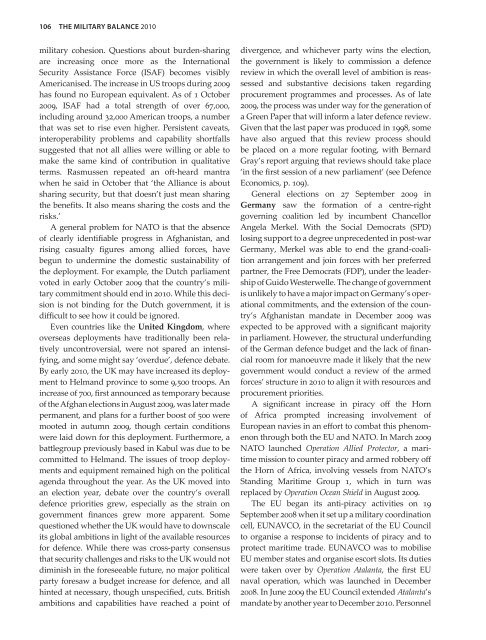You also want an ePaper? Increase the reach of your titles
YUMPU automatically turns print PDFs into web optimized ePapers that Google loves.
106 ThE MiliTary BalancE 2010<br />
military cohesion. Questions about burden-sharing<br />
are increasing once more as the International<br />
Security Assistance Force (ISAF) becomes visibly<br />
Americanised. The increase in US troops during 2009<br />
has found no European equivalent. As of 1 October<br />
2009, ISAF had a total strength of over 67,000,<br />
including around 32,000 American troops, a number<br />
that was set to rise even higher. Persistent caveats,<br />
interoperability problems and capability shortfalls<br />
suggested that not all allies were willing or able to<br />
make the same kind of contribution in qualitative<br />
terms. Rasmussen repeated an oft-heard mantra<br />
when he said in October that ‘the Alliance is about<br />
sharing security, but that doesn’t just mean sharing<br />
the benefits. It also means sharing the costs and the<br />
risks.’<br />
A general problem for NATO is that the absence<br />
of clearly identifiable progress in Afghanistan, and<br />
rising casualty figures among allied forces, have<br />
begun to undermine the domestic sustainability of<br />
the deployment. For example, the Dutch parliament<br />
voted in early October 2009 that the country’s military<br />
commitment should end in 2010. While this decision<br />
is not binding for the Dutch government, it is<br />
difficult to see how it could be ignored.<br />
Even countries like the United Kingdom, where<br />
overseas deployments have traditionally been relatively<br />
uncontroversial, were not spared an intensifying,<br />
and some might say ‘overdue’, defence debate.<br />
By early 2010, the UK may have increased its deployment<br />
to Helmand province to some 9,500 troops. An<br />
increase of 700, first announced as temporary because<br />
of the Afghan elections in August 2009, was later made<br />
permanent, and plans for a further boost of 500 were<br />
mooted in autumn 2009, though certain conditions<br />
were laid down for this deployment. Furthermore, a<br />
battlegroup previously based in Kabul was due to be<br />
committed to Helmand. The issues of troop deployments<br />
and equipment remained high on the political<br />
agenda throughout the year. As the UK moved into<br />
an election year, debate over the country’s overall<br />
defence priorities grew, especially as the strain on<br />
government finances grew more apparent. Some<br />
questioned whether the UK would have to downscale<br />
its global ambitions in light of the available resources<br />
for defence. While there was cross-party consensus<br />
that security challenges and risks to the UK would not<br />
diminish in the foreseeable future, no major political<br />
party foresaw a budget increase for defence, and all<br />
hinted at necessary, though unspecified, cuts. British<br />
ambitions and capabilities have reached a point of<br />
divergence, and whichever party wins the election,<br />
the government is likely to commission a defence<br />
review in which the overall level of ambition is reassessed<br />
and substantive decisions taken regarding<br />
procurement programmes and processes. As of late<br />
2009, the process was under way for the generation of<br />
a Green Paper that will inform a later defence review.<br />
Given that the last paper was produced in 1998, some<br />
have also argued that this review process should<br />
be placed on a more regular footing, with Bernard<br />
Gray’s report arguing that reviews should take place<br />
‘in the first session of a new parliament’ (see Defence<br />
Economics, p. 109).<br />
General elections on 27 September 2009 in<br />
Germany saw the formation of a centre-right<br />
governing coalition led by incumbent Chancellor<br />
Angela Merkel. With the Social Democrats (SPD)<br />
losing support to a degree unprecedented in post-war<br />
Germany, Merkel was able to end the grand-coalition<br />
arrangement and join forces with her preferred<br />
partner, the Free Democrats (FDP), under the leadership<br />
of Guido Westerwelle. The change of government<br />
is unlikely to have a major impact on Germany’s operational<br />
commitments, and the extension of the country’s<br />
Afghanistan mandate in December 2009 was<br />
expected to be approved with a significant majority<br />
in parliament. However, the structural underfunding<br />
of the German defence budget and the lack of financial<br />
room for manoeuvre made it likely that the new<br />
government would conduct a review of the armed<br />
forces’ structure in 2010 to align it with resources and<br />
procurement priorities.<br />
A significant increase in piracy off the Horn<br />
of Africa prompted increasing involvement of<br />
European navies in an effort to combat this phenomenon<br />
through both the EU and NATO. In March 2009<br />
NATO launched Operation Allied Protector, a maritime<br />
mission to counter piracy and armed robbery off<br />
the Horn of Africa, involving vessels from NATO’s<br />
Standing Maritime Group 1, which in turn was<br />
replaced by Operation Ocean Shield in August 2009.<br />
The EU began its anti-piracy activities on 19<br />
September 2008 when it set up a military coordination<br />
cell, EUNAVCO, in the secretariat of the EU Council<br />
to organise a response to incidents of piracy and to<br />
protect maritime trade. EUNAVCO was to mobilise<br />
EU member states and organise escort slots. Its duties<br />
were taken over by Operation Atalanta, the first EU<br />
naval operation, which was launched in December<br />
2008. In June 2009 the EU Council extended Atalanta’s<br />
mandate by another year to December 2010. Personnel


